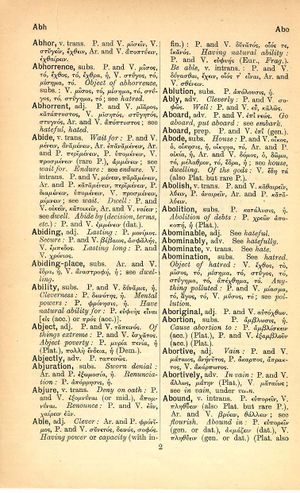able: Difference between revisions
From LSJ
ἐπ' αὐτὸν ἥκεις τὸν βατῆρα τῆς θύρας → you've come to the crux of the matter, come to the point, hit the nail on the head, you've come to the very threshold of the door, you are come to the very threshold of the door, you've arrived at the truth of the matter
mNo edit summary |
mNo edit summary |
||
| Line 4: | Line 4: | ||
<b class="b2">Clever</b>: Ar. and P. [[φρόνιμος]], P. and V. [[συνετός]], [[δεινός]], [[σοφός]]. | <b class="b2">Clever</b>: Ar. and P. [[φρόνιμος]], P. and V. [[συνετός]], [[δεινός]], [[σοφός]]. | ||
<b class="b2">Having power</b> or capacity (with infin.): P. and V. [[δυνατός]], οἷός τε, [[ἱκανός]]. | <b class="b2">Having power</b> or [[capacity]] (with infin.): P. and V. [[δυνατός]], οἷός τε, [[ἱκανός]]. | ||
<b class="b2">Having natural ability</b>: P. and V. [[εὐφυής]] (Eur., Frag.). | <b class="b2">Having natural ability</b>: P. and V. [[εὐφυής]] (Eur., Frag.). | ||
Revision as of 17:43, 22 September 2017
English > Greek (Woodhouse)
adj.
Clever: Ar. and P. φρόνιμος, P. and V. συνετός, δεινός, σοφός.
Having power or capacity (with infin.): P. and V. δυνατός, οἷός τε, ἱκανός.
Having natural ability: P. and V. εὐφυής (Eur., Frag.).
Be able, v. intrans.: P. and V. δύνασθαι, ἔχειν, οἷός τʼ εἶναι, Ar. and V. σθένειν.

